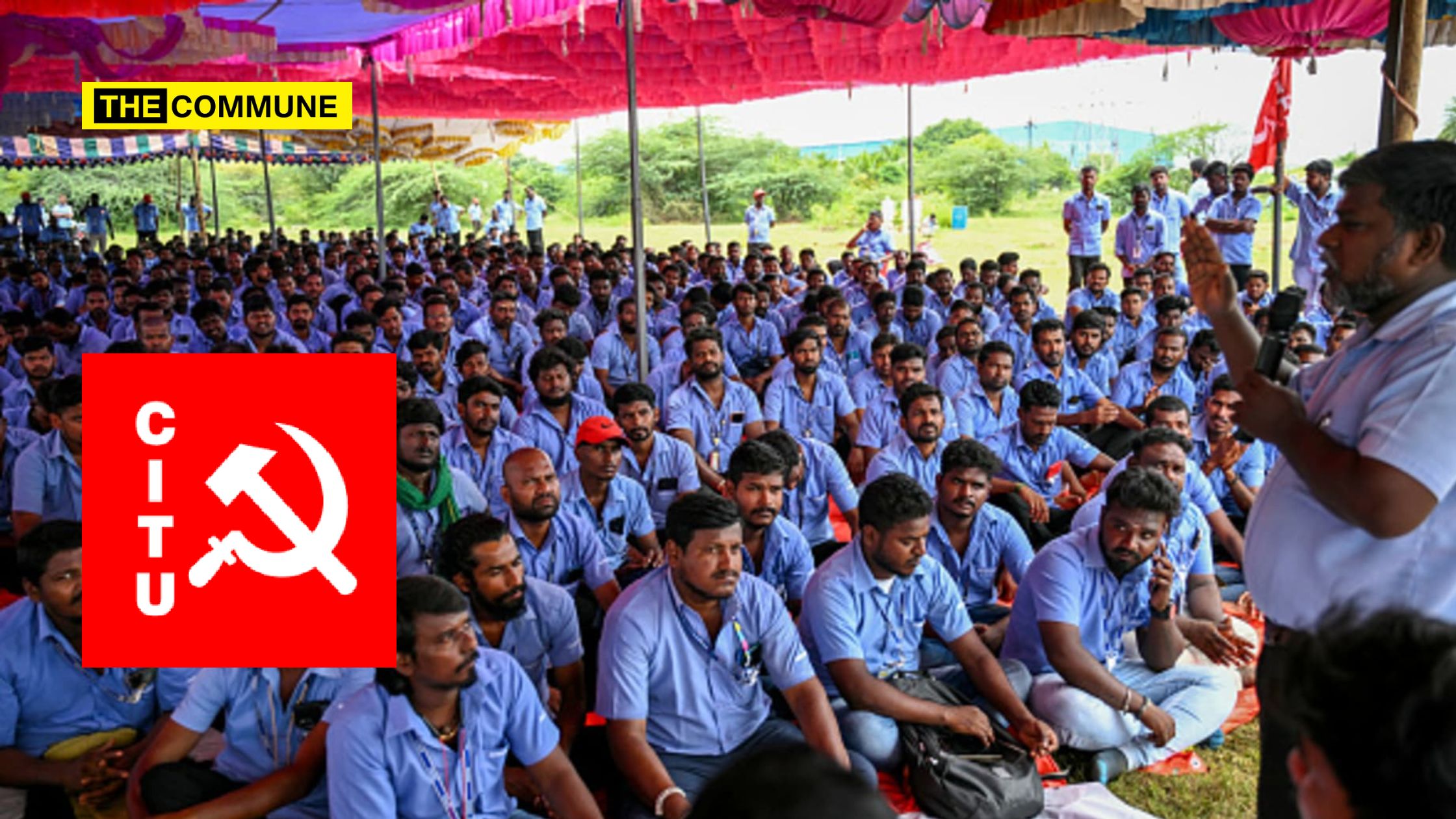
The recent protests at Samsung’s Sriperumbudur facility near Chennai, spearheaded by the Centre of Indian Trade Unions (CITU), have sparked controversy. While the CITU claims to be fighting for workers’ rights, critics argue that the protests are more about advancing the union’s agenda than genuinely addressing worker concerns at the Samsung factory.
The labor unrest, which has garnered support from political allies of the ruling DMK, including the VCK and Communist parties, has raised questions about the strike’s real motivations. The CITU is pushing for a union with Muthukumar, a CITU district head for Kanchipuram, as its leader even though Samsung does not employ him. This demand and the creation of unions in 25 other companies highlight the trade union’s aggressive efforts to expand its influence.
Documents reveal that the CITU applied in July 2024 to register a union at the Sriperumbudur facility. However, Samsung raised concerns about using its name in the proposed union’s title. The matter escalated when the CITU took the case to the Madras High Court. Despite the court’s intervention and the government’s promise to abide by the ruling, the CITU resisted Samsung’s objections.
Critics of the CITU argue that such unions have a history of damaging businesses in India. They cite examples like Pricol in Coimbatore, where a similar union-led protest turned violent, leading to the tragic death of a company executive in 2009 and the eventual relocation of half of the company’s operations. In Kerala, Chief Minister Pinarayi Vijayan himself admitted that CITU’s aggressive tactics have deterred industries from investing in the state, urging the union to adopt more modern approaches.
Samsung is determined to avoid the fate of companies like KITEX, Porkkali Steels, and Binny Mills, which have suffered under union pressure in Kerala and Tamil Nadu. The company’s refusal to allow the formation of a union is seen as a defense against the kind of disruption that nearly crippled Foxconn in 2010 due to similar protests. Samsung, like many other companies, is exercising its right to protect its business interests in the face of what it views as politically motivated interference.
Allegations
The allegations of poor working conditions at Samsung, including inadequate sanitation and commuting facilities, have also come under scrutiny but they all fell flat. Detractors argue that these claims are exaggerated, pointing out the hypocrisy of communist publications like TheeKathir, which pay meager wages despite advocating for labor rights.
Core Agenda of the Agitation
The protesters’ primary focus is their demand for the official recognition of the newly established Samsung India Workers’ Union (SIWU), affiliated with the Centre of Indian Trade Unions (CITU), a left-oriented labor organization linked to the Communist Party of India (Marxist).
Samsung has opposed this demand, asserting that it does not support unions participating in collective bargaining alongside external leaders. Additionally, the state labor department has not acted on the workers’ request to register their union.
Political Implication and Investor Climate
The Sriperumbudur facility, operational since 2007, has never faced such protests before. Samsung’s current stance appears to be influenced by recent developments in its global operations, they follow a “No Union Policy”. N. Muthukumar, the Kancheepuram district secretary of CITU and leader of the proposed SIWU, oversees several other CITU unions within the Sriperumbudur industrial region leads this protest to have a union in the facility.
Historically, both CITU and the CPI(M) have backed the MK Stalin-led government, but this strike has strained that alliance. CITU has called for a one day token strike on 21 October across the northern industrial area, which comes at a precarious time for the state government. Just last month, CM Stalin was in the United States promoting Tamil Nadu as an investment destination while announcing various investment agreements when news of the unrest surfaced.
Importance of Samsung India
For Samsung, the Sriperumbudur plant is vital, generating approximately one-third of its annual revenue in India. The facility manufactures appliances like refrigerators, washing machines, and televisions, making this strike one of the largest labor disruptions the company has faced in the country.
While contract workers, who comprise a significant part of the 5,000-strong workforce, are not participating in the strike, overall production has noticeably decreased, with reports indicating a reduction of at least 50%. Samsung has maintained that the strike is not related to wages or working conditions, which they assert have already been addressed, but rather a bid by CITU to assert control over the workforce.
Samsung India’s Recent Commitments
- On 8 October 2024, Samsung India signed a Memorandum of Agreement (MoA) with a group of workers, addressing various demands and aiming to resolve the ongoing strike that began on 9 September 2024.
- The company has pledged to enhance the work environment for its employees and will establish a committee to engage with workers on measures to improve wage competitiveness continuously.
- Additionally, they will introduce a special incentive of ₹5,000 per month from October 2024 to March 2025, with details to be finalized through discussions with the workers’ committee.
- Samsung also plans to expand its air-conditioned bus service from five routes to all 108 routes by next year and increase the frequency of family invitation events from four to six times annually, offering gifts worth ₹ 2,000 to participating families.
- In the event of an employee’s death, the company will provide immediate assistance of ₹ 1 lakh to their family.
- Furthermore, Samsung intends to establish a new medical room in the compressor building, diversify the cafeteria menu, raise meal allowances, upgrade break rooms and restrooms, replace outdated lockers, install canopies between buildings, and increase vacation days for workers.
- They will also give a ₹2,000 gift card to employees upon the birth of a child.
- The company announced the introduction of three days of marriage leave and will extend paternity leave from three to five days for the first and second child, with further vacation policy changes to be discussed with the workers’ committee.
Critics contend that the communists are simply flexing their power like thugs against a multinational corporation that has genuinely cared for its employees, even providing support during the difficult COVID period. The company has offered 15 months’ salary, a 15% salary increase, medical insurance of ₹5 lakh, as well as free meals and transportation.
If this approach persists, Tamil Nadu may face significant shift away of companies, leading to a lack of businesses and investments, ultimately resulting in widespread unemployment.




